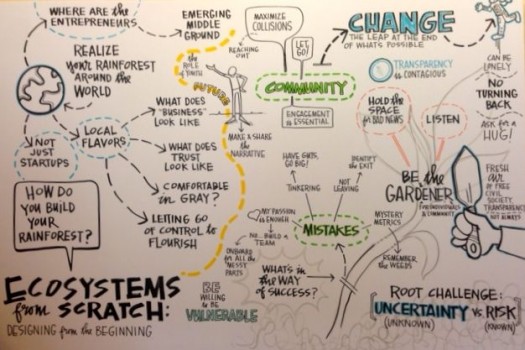Sharon Zukin, Professor of Sociology at Brooklyn College, presented her current project entitled “New York’s Creative Ecosystem: ‘Imperial Project’ or Lively Arts?” at the Advanced Research Collaborative on Thursday, October 16, 2014. The project is in its initial stages, and explores New York City material changes (changes to physical city structures) and their connection to changes in creativity, and to resulting changes in how people conceptualize the city.
The theme in her work can be expressed as a comparison between, on the one hand, corporations supporting and instigating city-wide creativity, and on the other hand, individual artists creating art on a smaller scale, and perhaps in a purer sense. One illustration she made of this was the fairly new trend of artists and creators making use of shared physical spaces, contrasting starkly with the “old ideal of the independent artist” and private studio.
Dr. Zukin next identified large-scale, corporate-financed, “marketed” art initiatives, such as Bloomberg’s Public Art Challenge, a grant supporting temporary public art projects. Another example was Red Bull Studios New York—self-defined on their website as “a multi-disciplinary project space located in the heart of Chelsea, featuring an exhibition space, state of the art recording studio, radio booth, lecture hall and performance space”—a case of a corporation “reaching out” and subsidizing the creation of music by young males (the target group marketed by Red Bull). These examples contrasted with examples of the small-scale, unsubsidized, individual artist, illustrated by photographs taken by the author herself of—for example—an unemployed philosopher offering “creative advice” in Union Square, and a hipster in Downtown Manhattan advertising her creativity on a T-shirt, and identifying it a source of power.
The author drew her talk to a close by establishing five “reshaping” strategies, observed in two general geographical areas: one from Midtown to Lower Manhattan, and one in Brooklyn stretching from Greenpoint through DUMBO. The strategies are as follows: One, attract corporations, such as the Google building in Chelsea; two, re-industrialize, such as the case of the Brooklyn Navy Yard being utilized today as a commercial space and creating thousands of jobs in Brooklyn; three, build on “DIY” (“do it yourself”), such as the New York Media Center in DUMBO; four, encourage small mixed-use development, such as the Chelsea Market; and five, commercialize cultural consumption, as evidenced by the event space and café “Wallplay” in the Lower East Side.
These trends and implementations came together to paint a picture of the varied efforts being made to sustain NYC as a cultural center, cultural icon, and creative ecosystem.





